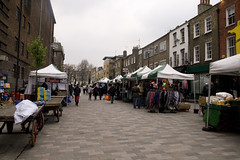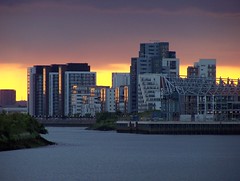The Future Scotland debates: can architecture “set our souls free”?

Posted June 17, 2009 at 1:26PM
Barry Didcock, a contributor to Glasgow's Sunday Herald, seems to think it can. Me, I don't know that architecture can set my soul "free," exactly, but I believe it can indeed be soul-stirring and soul-nourishing.
The question arises because the Glasgow-based Lighthouse Centre, which strives to be "a leading body for the promotion of architecture, design and the creative industries," is hosting a series of debates about the future of Scotland's built environment. So far they have hosted sessions on public spaces and education, with housing, "regeneration," sustainable places and health yet to come during the summer.
Didcock wrote an essay about the series for his paper, and I like both the way he writes and the observations he draws out of those he interviews:
"The built environment is a woolly phrase used by architects and planners to mean the things around us. It sounds remote from our daily lives but unless you live in a yurt on a beach with a view of the mountains, those 'things' do matter. They are the schools your children learn in, the hospitals you go to when you're sick and the doctors' surgeries you fret in when you think you might be. They are houses, shops, offices, cinemas, bus stations, and branches of Starbucks. They are the places in which you love, laugh, sleep, eat, wait, work and queue for a cappuccino . . .
"Now is the time to ask questions. Why is that road so noisy? Why don't these windows open? Why is my house so dark? What would happen if the whole town centre was pedestrianised? Why isn't there a permanent farmers' market?
The answers are out there, and so is the ability to make change happen . . .
"[Architect and Future Scotland participant] Malcolm Fraser can point to some good [recent] residential projects. He's a fan of the EDI Group's regenerative programme in Edinburgh's Craigmillar housing scheme, for instance. He likes the fact that it puts creation of community ahead of any other priority, that it uses government money creatively, and that it employed one of Scotland's best architectural companies - Glasgow's Elder and Cannon - to build which he thinks is easily the best-designed school in the country, Niddrie Mill and St Francis Primary School. But he is no fan of those volume housebuilders whose major marketing tools are "kerb appeal" - what the house looks like when you pull up outside in your car . . ."
Here's what Didcock writes about sustainability:
"As for the future, sustainability is one of the key issues. It means environmentally-conscious design, and includes everything from using solar power for heating to flushing toilets with rainwater . . . For Fraser, sustainability means working with existing environments as much as it means creating new ones. Make do and mend is his mantra, and a good Scottish virtue it is too.
"'There's a circus out there telling us a sustainable eco-future is about building enormous dormitory towns on farmland somewhere, but they'll be eco' because they'll have Prince of Wales-approved pediments around the front door. That is an enormous smokescreen.'
"He points to the window, gesturing once more across the Edinburgh rooftops. 'You want an eco town? There's one. Our eco towns are our existing settlements. They've got railway stations in the middle, they're dense, they're walkable, they're liveable. I live my life in Edinburgh without a car. There's a mountain here I can climb and my architectural career has been about reinforcing the integrity of a place where you can live with a small carbon footprint.'"
That's my kind of sustainability. Read Didcock's whole essay here, and visit the Lighthouse Centre's site for more, including transcripts of the sessions held so far. I note that the sustainable places session is scheduled for August 21, in the Scottish Parliament. Sign me up.

